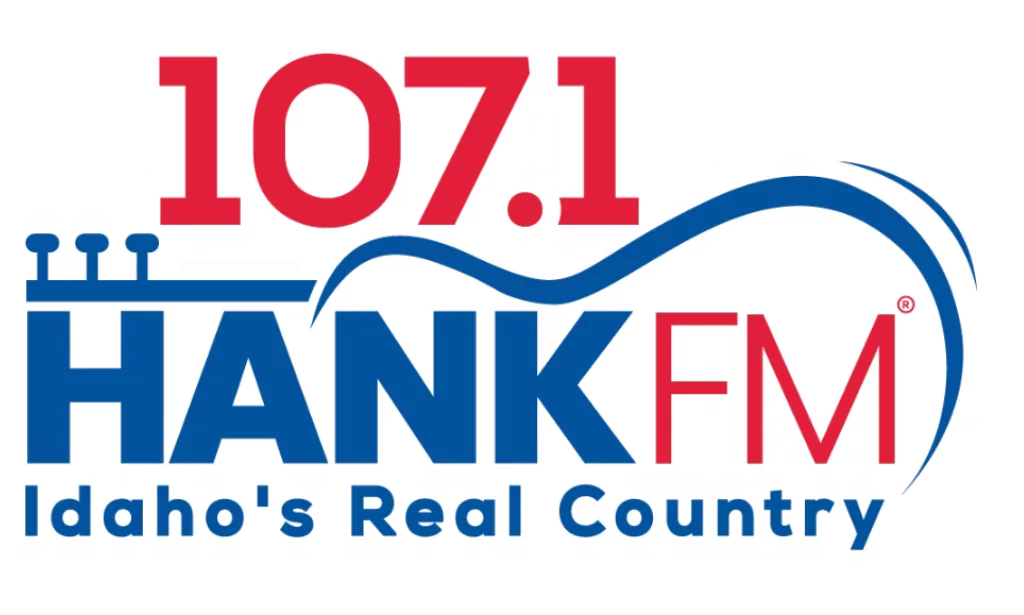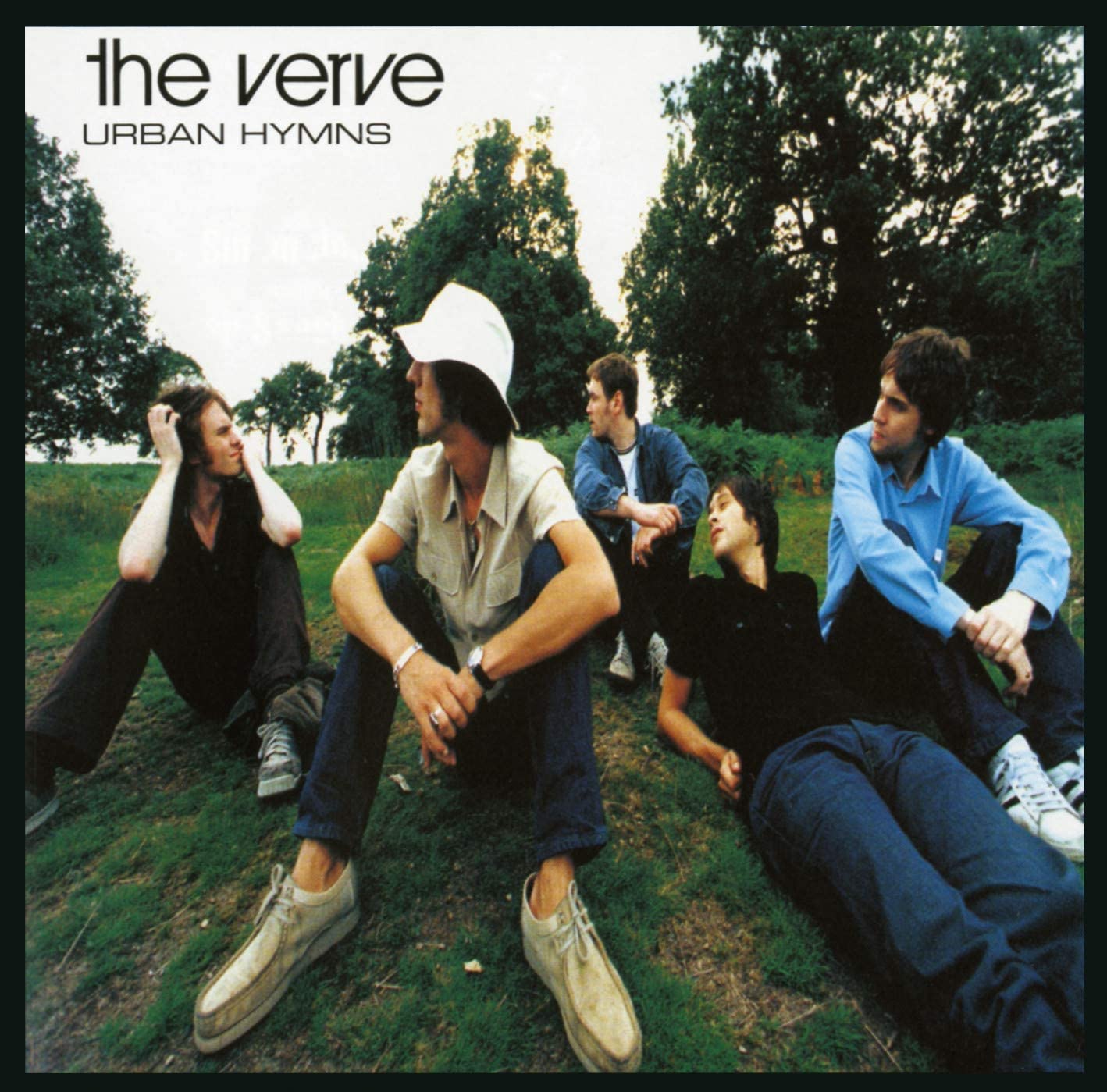
In 2017, 20 years after the release of the 10 million-selling Urban Hymns, The Verve’s Nick McCabe talked to Classic Pop to shed some light on the band’s turbulent story and his own defining role in creating one of the greatest albums of the 1990s… By Richard Purden
Time has not diminished the impact of Richard Ashcroft swaggering down London’s Hoxton Street, inviting confrontations with passers-by, in the promo video for The Verve’s Bittersweet Symphony.
Under a pile of dark, tousled hair, nonchalant eyes and clad in denim and leather, there was a sense of Marlon Brando’s Johnny Strabler from The Wild One being updated for the 90s.
In the way that rebels do, he inspired confidence in a generation suffering at the comedown of Britpop. The accompanying music was emotive modern blues, delivered by a band of long-time indie strugglers from the north-west of England – a post-industrial working class song for the people which secured The Verve a No.2 hit in the UK singles charts.
It’s now 20 years since The Verve achieved phenomenal commercial success with their third studio album, Urban Hymns. In 1995, following A Northern Soul, the band split and Ashcroft began work on a solo album.
But within two years, the band had reunited (with additional guitarist Simon Tong) and on 29 September 1997 returned with the seminal album Urban Hymns.
Producing three Top 10 UK singles, including a No.1 with The Drugs Don’t Work, the band enjoyed Brit Award success, a Grammy nomination for Bittersweet Symphony and worldwide acclaim.
While promoting his latest album, These People, Richard Ashcroft suggested that Urban Hymns should have been that first solo album he intended to make and these words have grieved The Verve’s co-founder and guitarist Nick McCabe.
His often improvised, psychedelic playing drew on a range of sonic effects giving The Verve much of its characteristic sound along with the intuitive groove-driven energy between bass player Simon Jones and drummer Pete Salisbury.
“It’s funny because I know what the record sounded like before I got involved,” says McCabe today, “and it needed me. The songs that Richard brought in, he probably wrote hearing me play on them.
“When he sat there with the acoustic putting those chords together he heard my guitar over it and, as far as I’m concerned, when I did then put my guitar over the record things suddenly made sense.
“It sounded great. If he had put it out how it was before then it would have been another Richard Ashcroft solo album.
“Whether it would have done as well, I don’t know. I think the other important thing is that people bought into the band the way that they bought into Oasis.
“If back in 1993 Noel Gallagher released his first solo record we might be talking about a very different history.”
As McCabe suggests, there is a significant shared timeline with Oasis dating back to 1993 when the Manchester collective were asked to support Verve, as they were then known, for a string of dates.
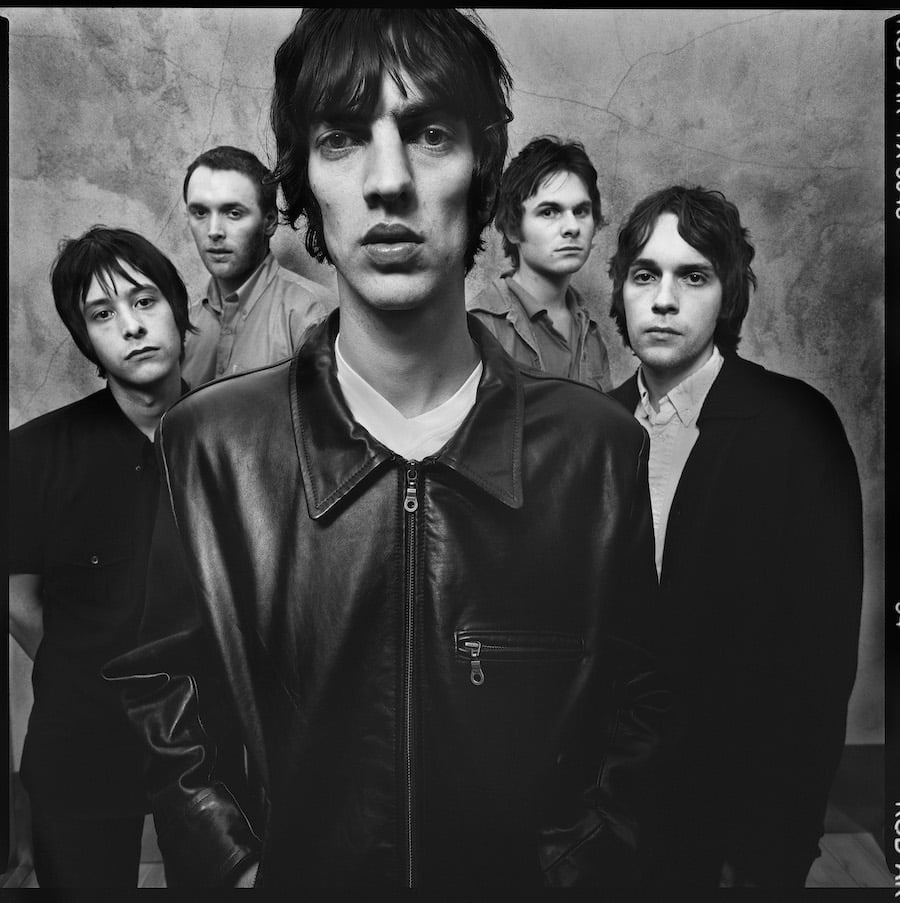
“We’d have tapes sent to us for potential support bands and most of them got thrown out of the window by Richard as we were driving. There were three tapes that survived and one was the Oasis demo, which we identified as part of what we were doing.
“It was obviously northern and the energy was the same. The first track was Columbia and it was the best one on the demo. I watched them soundcheck and even at that stage they were this fully-formed thing.
“They were true to the music that they represented and their heritage – we wanted to get closer to that. With A Storm In Heaven, there’s no mistaking that’s not the band that Virgin signed.”
- Read more: Best Stone Roses songs
Oasis introduced Ashcroft to new values which helped change the direction of their songwriting and attitude. “I think they did have a massive influence.
A lightbulb went on with Richard realising what people gravitated towards Oasis for. After that, he was bringing in songs like History, On Your Own and No Knock On My Door to the band.
“We did some stocktaking after watching the Oasis story unfold. I think there was a point when Richard realised we had walked the other path too far, we were avoiding populist things and throwing away what people liked about Oasis.
“If we hadn’t split in 1995, I suppose that’s what we were shifting towards. By that point we were looking at where we went wrong.”
While Urban Hymns may have started out as a solo album, Ashcroft soon became aware it was vital that The Verve, with McCabe reinstated, was the answer to why the record was not reaching its full potential.
Various members have suggested a spiritual dimension graced the recording sessions when the original line-up eventually regrouped with the addition of Simon Tong on rhythm guitar and keyboards.
The peace wasn’t to last and disputes about the album remain to this day. “When I read stuff like that [Ashcroft claiming Urban Hymns should have been a solo album] I think ‘why are you still so angry, why are you trying to steal credit from me for guitar parts that I recorded 20 years ago? Can’t you allow me my kudos as well?”
It’s not a stretch to suggest that the guitarist’s contribution and development of signature tunes such as Come On and The Rolling People were every bit as important to the record’s success as the album’s hits. In truth, there are a raft of reasons why the stature of Urban Hymns continues to grow.
The last gang in town
With the success came controversy and wounding experiences. The music began to take on a life of its own. On Bittersweet Symphony the band used a sample from an orchestral version of The Rolling Stones’ 1965 single The Last Time.
Recorded by The Andrew Oldham Orchestra, it proved to be one of the most bitter disputes in popular music history with Stones manager Allen Klein ultimately receiving 100 per cent songwriting royalties. Former Stones manager Andrew Loog Oldham would also successfully secure royalty payments.
Despite Ashcroft’s lyrics, along with Will Malone’s string arrangement, the song was credited as a Jagger & Richards composition, leaving the singer to comment that it was the best song they had written in 20 years.
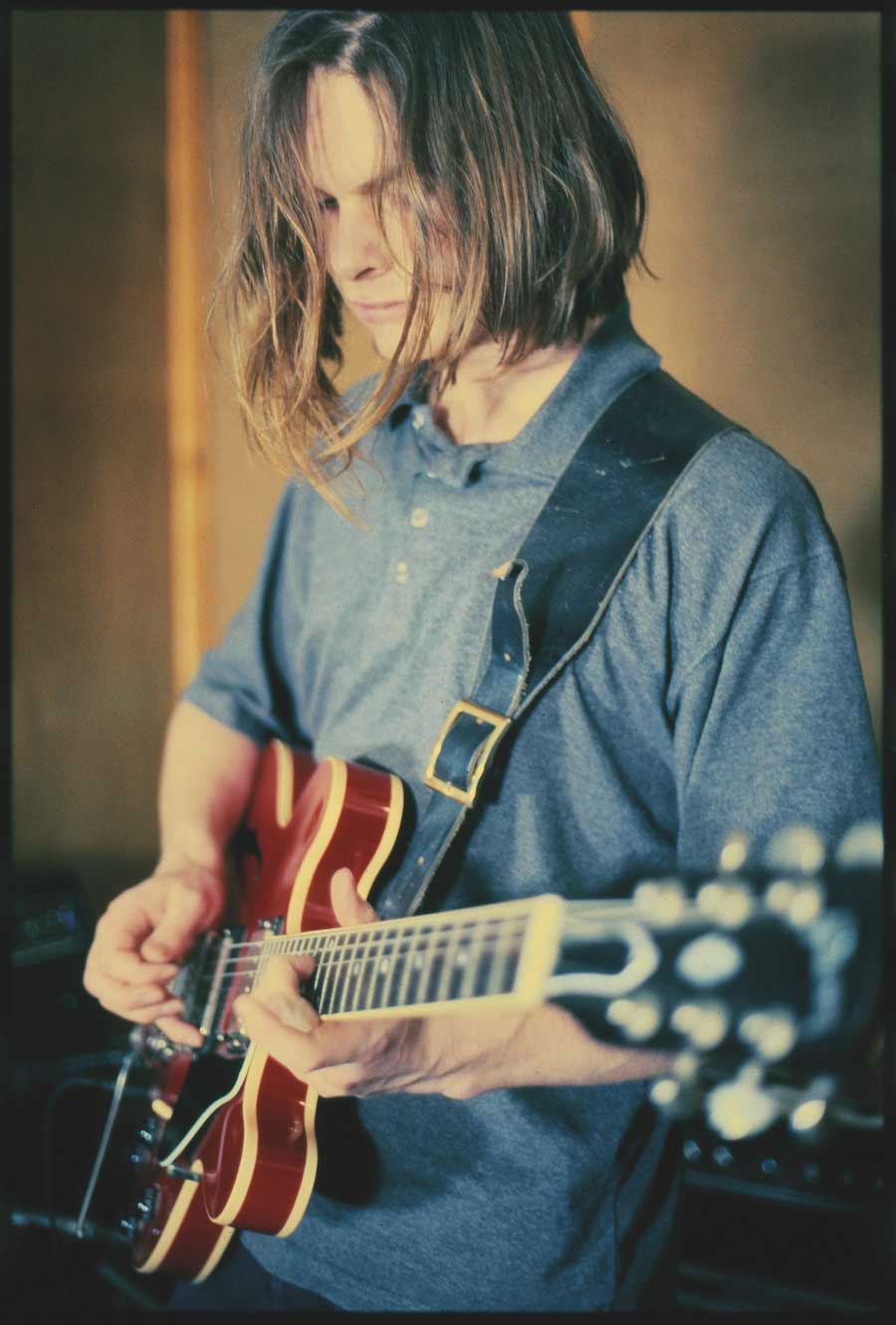
Keith Richards suggested that if they could write a better one then they could have the money – he was perhaps unaware of their follow-up, The Drugs Don’t Work, which gave the band their first No.1.
Days before the release of Urban Hymns, The Verve would once again play alongside Oasis. The Manchester five-piece had delivered two unit-shifting classic rock’n’roll albums and brought their last gang in town mentality back into the charts.
Their third album, Be Here Now, failed to live up to the monumental hype and it seemed as if the baton had been passed on.
Supporting Oasis at Earls Court in London, The Verve walked on stage 10 minutes early to play a longer set. Richard Ashcroft rightly proclaimed that they were going to take the roof off.
“I remember that gig really well,” says McCabe. “There was a lot of criticism of Oasis at the time and I wondered what people were down about because the single, D’You Know What I Mean?, was good. We knew we had made a great record and we could back it up, we were gearing up around it.
“Oasis didn’t have the mission anymore, they had become accepted and digested and established their style. I suppose the game was up because there was nothing else to play for, they had proven themselves.
“One of the things we always had in our favour was that we were never accepted. That gave us the impetus to be bloody minded and turn our backs several times on the career if you can call it that.
“That was palpable with us, there was a resistance and a sense of combat that cut both ways. It could alienate some people but if you wanted to get on board it was worth the price of the ticket.”
Communication breakdown
Urban Hymns achieved the five million sales mark in a matter of months and would eventually surpass 10 million copies around the globe. Ashcroft appeared on American newsstands as the featured cover star of Rolling Stone magazine.
The eye-catching headline blazed ‘The Verve and the return of rock’n’roll’. Just after the band’s legendary appearance at Wigan’s Haigh Hall, another cover story, this time in the NME, ran with ‘McCabe quits… Again! Is this the end for The Verve?’
The guitarist suggests it was another false explanation of what really happened.
“I never left, but I’ve been sacked a few times in favour of a project that is ongoing (Ashcroft’s solo career), which feeds into why some of us appreciate an investment that can’t be ignored and others can’t see that because it’s tied in with another perspective.”
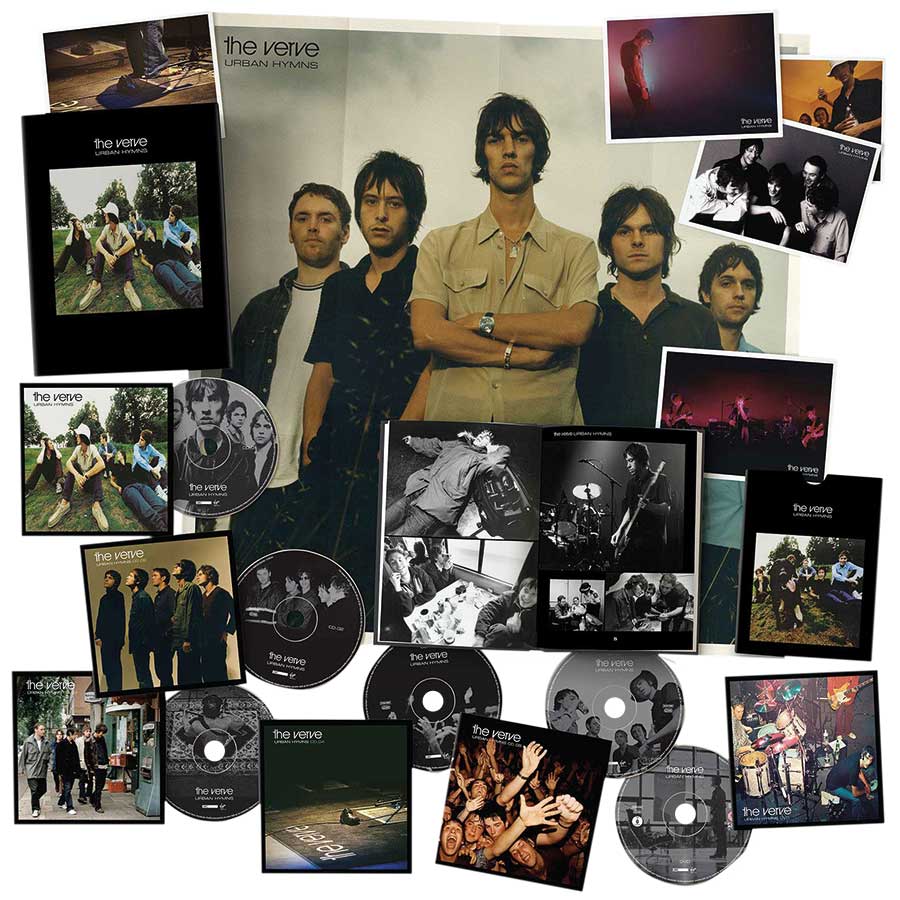
The band’s hedonistic lifestyle, particularly when recording A Northern Soul, and varying health problems have been well-documented.
Today, McCabe is a devoted family man with a settled outlook but there remains unresolved issues with Ashcroft.
“I can function better than I did between 1991 and 1994,” he says. “The cost in The Verve has been quite high for me. I’m the one who has had the most personal cost out of this band.”
A case in point is the aftermath of their Haigh Hall live show when McCabe was ordered to make an impossible decision: “I had glandular fever and was self-medicating as I had not been diagnosed and was in a bit of a state. I went to see a doctor on the advice of the manager, Jazz [Summers] who is no longer with us.
“His doctor said ‘you are not going on tour’. I suggested delaying the dates as I wanted to get better. I was offered an ultimatum: either do the gigs or I was out of the band. I didn’t expect that gambit, perhaps it was the threat of insurance but they went ahead and did those gigs which was the American tour essentially…
“Pete and the two Simons were told minutes before going on stage that Richard had signed a solo deal with Virgin.”
The saving grace, looking back at the Haigh Hall gig, is that it was a defining moment for the small towns in the north-west – that was their Spike Island.
The band would return for festival dates, but the writing was on the wall: The Verve without their idiosyncratic and definitive guitarist was unworkable. “It’s easy to be resentful of things that went right or left” explains McCabe.
“We’re not writing cinema, this is real life and these are actual events. Fighting over a record that is 20 years old is bizarre. It’s weird knowing who Richard was when we made Urban Hymns.
“There was a unity by the time we got back together and a climate of… not forgiveness, but acceptance and moving forward. He managed to derail that again.
“There was a generosity of spirit around the record that makes the hostility now seem sad and makes me think: ‘what happened mate?’ It’s surprisingly pleasant how well the stuff stands up. I’ve made my peace with it. From this vantage point I can see what we achieved as young men and I appreciate the spirit it was done in.”
- Want more from Classic Pop magazine? Get a free digital issue when you sign up to our newsletter!
The post Interview: Nick McCabe on The Verve’s Urban Hymns appeared first on Classic Pop Magazine.

